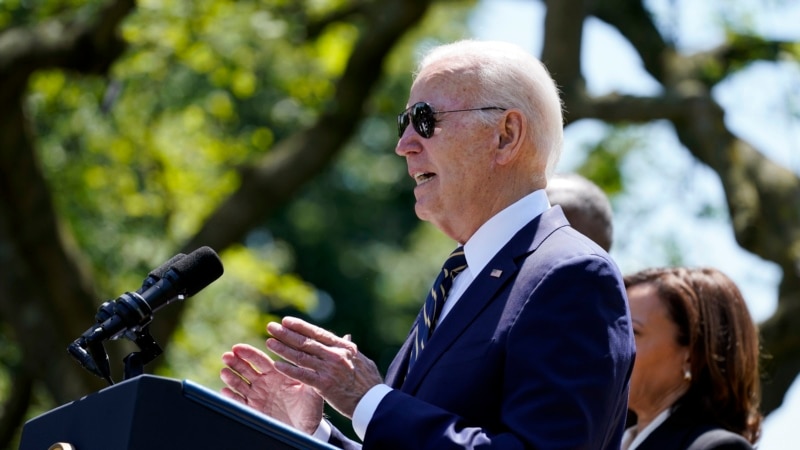
President Joe Biden said Thursday that negotiations with Republican lawmakers to increase the debt limit of the United States government and setting future spending levels go well, while reassuring Americans that the country will not default on its obligation to pay its bills.
White House budget negotiators continued to talk with representatives of Republican House Speaker Kevin McCarthy to work out the final details of a deal, but no solution was announced as lawmakers began leaving Washington ahead of the annual weekend. Memorial Day in the country.
The Republican-controlled House of Representatives is not scheduled to return until Tuesday, just two days before June 1, the date Treasury Secretary Janet Yellen says the government could run out of cash to meet its obligations if the country’s current debt ceiling of $31.4 trillion is not raised so the government can borrow more money. Both the House and the Senate must pass the debt limit increase before Biden can sign it into law.
The focus of the negotiations, Biden said, was on future spending, for the budget year beginning in October and beyond. Republicans are trying to slash spending, while the Democratic president and his congressional colleagues are trying to keep as much funding as possible for their legislative priorities.
At the US Capitol, McCarthy said he had ordered his negotiators “to work 24/7 to resolve this issue.” “We have to spend less than we spent last year. That is the starting point,” he said.
A key Democratic lawmaker, Rep. Katherine Clark, characterized the negotiations as “a battle between extremism and common sense.” The Republicans, she said, “want the American people to make an impossible choice: devastating cuts or devastating debt default.”
Fitch Ratings Agency placed the AAA credit of the United States on “negative rating watch,” warning that the government is at risk of a potential downgrade due to what he described as risky political partisanship surrounding the debate over lifting the debt ceiling. The debt ceiling has been raised 78 times since 1960, including three times under Republican President Donald Trump.
Nonetheless, Fitch said it “still awaits a resolution” on the current debt ceiling and budget negotiations.
A Treasury Department statement Wednesday night noted that Fitch’s warning “underscores the need for swift bipartisan action by Congress to raise or suspend the debt limit and avoid a manufactured crisis for our economy.”
A White House statement said Fitch’s move “reinforces the need for Congress to quickly pass a reasonable bipartisan deal to avoid default.”
However, it remained unclear exactly how Biden and Democrats pushing relatively modest cuts in public spending and Republicans pushing deeper cuts can come to an agreement, and by how much the debt ceiling would be raised further. from your current level.
“I will not raise taxes,” McCarthy has said, rejecting a White House proposal to raise taxes on the wealthiest American taxpayers and big corporations. Nor, he said, would he allow a House vote on a measure to raise the debt ceiling without accompanying it with spending cuts.
“Sixty percent of Americans believe we shouldn’t raise the debt ceiling without cutting spending,” he said.
White House press secretary Karine Jean-Pierre told reporters Wednesday that the Biden Administration says it is possible to reach a “reasonable bipartisan agreement whereby Republicans and Democrats in the House and Senate can move forward.” ”.
Jean-Pierre assured that the American people do not want what she called “devastating cuts” sought by the Republicans.
“House Republicans have said we should make these cuts in the name of fiscal responsibility and deficit reduction, but that’s not what this is about. That’s never been what it’s about for them,” Jean-Pierre said. “Because even as they fight to destroy investments in working families, they want to turn around and protect tax breaks skewed toward the wealthy and corporations.”
The government hit its existing borrowing limit in January, but the Treasury has taken “extraordinary measures” since then to keep paying its bills. Without enough new tax revenue flowing into government coffers in the first days of June, the government will be faced with the difficult choice of which bills to pay.
Officials have warned that a default by the United States, the world’s largest economy, could prove catastrophic, roiling world stock markets, forcing job layoffs in the United States and hurting the nation’s solvency, resulting in in higher interest rates for borrowers.
Connect with the Voice of America! Subscribe to our channel Youtube and activate notifications, or follow us on social networks: Facebook, Twitter and Instagram.








![[Img #74675]](https://thelatestnews.world/wp-content/uploads/2024/12/They-discover-a-new-class-of-X-ray-sources-in-the-150x150.jpg)




